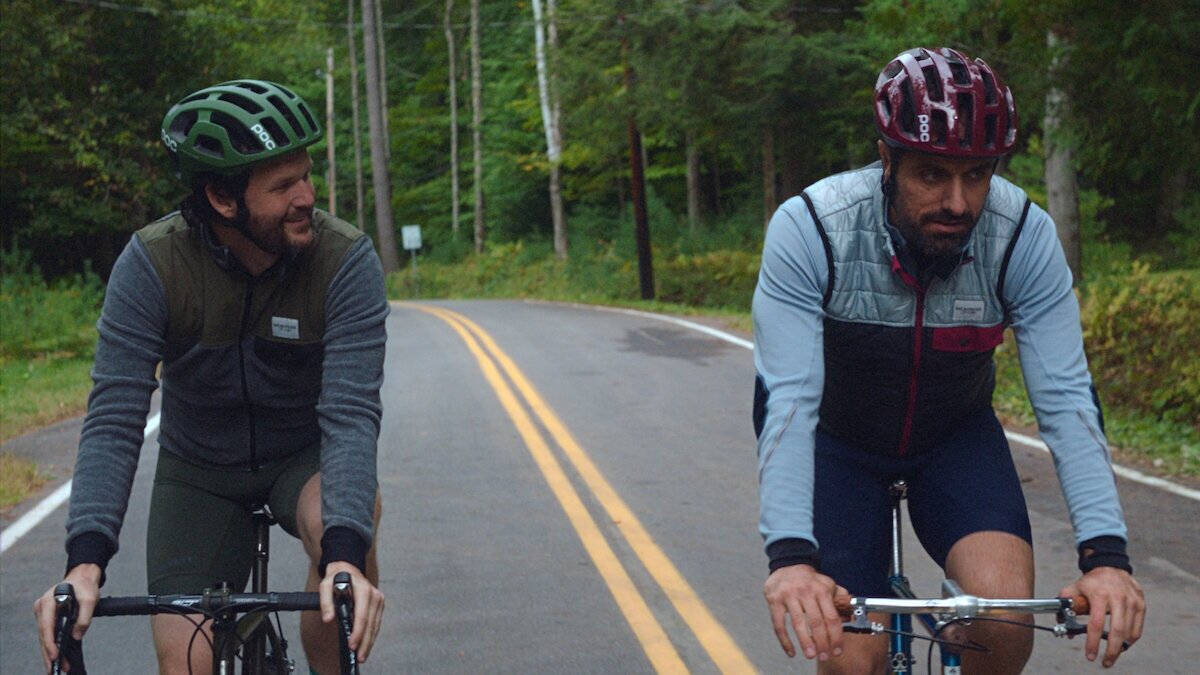The Climb
Sony Picture ClassicsThe Climb opens with what can only be termed as ‘the titular scene’ where Kyle and Mike (Kyle Martin and Michael Angelo Covino, who co-wrote the film, with the latter directing) are out on a cycling trip. The camera shadows the pair in a single unbroken take as they struggle up a steep hill while trying to maintain a conversation. Their banter quickly reveals that Kyle is getting married and that Mike is going to be his best man. That is until Mike admits to having an affair with Kyle’s fiancé, which sends the scene spiralling into madness and ends with Mike being beaten senseless by a complete stranger in – all within the same take.
The camera then cuts to a hospital where, in another single unbroken take, the drama of betrayal continues interspersed with light-hearted comedy stemming from the fact the hospital is in France and neither Kyle nor Mike speak French well enough to communicate with the doctor. But then Kyle’s fiancé walks into the frame and – again – all hell breaks loose; once more documented in an unbroken take. The film goes on from there.
This artistic decision on behalf of the filmmakers to shoot almost everything in long tracking takes with the camera roaming in and out of rooms, mingling with the characters and eavesdropping on ancillary conversations clearly has its purpose, which is two-fold. First of all, it bolsters the film’s immediacy and allows the viewer to follow and analyse Mike and Kyle’s troubled friendship in an increasingly intimate way. But most of all, it looks like a decisive nod to other directors Covino and Martin surely hold in great esteem, such as Martin Scorsese and Paul Thomas Anderson. In fact, astute viewers might find this realisation a little bit distracting because they will be alerted to a possibility there’s more treasures to be mined in this film.
And indeed, The Climb might end up impossible to follow for self-ascribed adepts of cinema because their focus will be constantly divided between trying to stay abreast of this rollercoaster of betrayals, wedding-crashing and hangout comedy, and fishing for references to other movies, with which the film is filled to the brim. As a result, the experience of watching it may feel oddly familiar, but alien nonetheless. That is because this whole film is a medley of melodies and licks lifted from Scorsese, Paul Thomas Anderson, The Coen Brothers, Spike Lee, Wes Anderson, Kevin Smith and many, many more.
This gives The Climb a unique texture that evades straightforward definition. It is as though these two lads picked up the camera and imagined what it would be like to borrow the dynamic between Dante and Randal from Clerks, filter it through a flashy aesthetic picked up from Boogie Nights and Magnolia, sprinkle in the tone of a Coen Brothers production and occasionally spice everything up by nodding to Spike Lee and Jonathan Demme with deliberate framing and wide-angle lens usage. What they managed to create, cinematic magpies that they are, is a patchwork of references and inspirations that somehow rise above the level of deference to the greatness they borrow. They synthesised a collage out of familiarity provided by the works of other people, thus tuning into the frequency of the early 1990s indie revolution nearly three decades later, but they maintained their own strong artistic voices in so doing. These two young whippersnappers successfully cloned the philosophy of how Quentin Tarantino embarked on his own filmmaking career without ever looking like copycats.
Suffice it to say that The Climb is simply one of a kind. It’s a smorgasbord of references to the greats of cinema which is also immensely entertaining, dramatically exhilarating and no-holds-barred comedic. Most importantly, however, underneath its thick layer of artistic nods and pervasive flashiness, it is also an elegant and touching exploration of male camaraderie, romantic relationships, parenting and much more. In a way, The Climb can be most aptly described as a cinematic palimpsest: a beautifully original story about two men going through life together while constantly locking horns, written over top of a carefully assembled photomontage of the filmmakers’ favourite movies. Even though it officially premiered at the Cannes Film Festival in 2019 and had to navigate a string of delays owing to the raging pandemic in order to miraculously secure its theatrical release, this almost-forgotten dramedy with its buzzed-up nosy camerawork and a slowly unfolding narrative bedlam should be counted as one of the most compelling and entertaining films to grace the screens in 2020.


